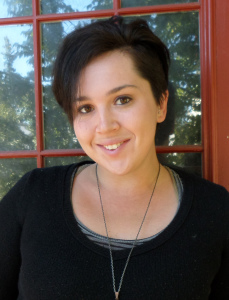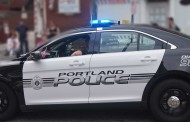
Lauren Besanko, Munjoy Hill Resident. Courtesy Photo
A couple of months ago there was meeting put on by our local NAACP chapter at the Portland Public Library to respond to the crisis in Ferguson, Missouri, where a white police officer shot to death an unarmed black teenager, Michael Brown. There were many ideas and opinions thrown around at the meeting, but the overarching theme was that the shooting in Ferguson was not an isolated incident. Police all over the United States do engage in and have the ability to engage in racial profiling and anti-protest tactics. We need to change this culture to protect our community members, particularly those who are black men.
Police Chief Michael Sauschuck was there, but didn’t speak. It was his time to listen, not defend or respond. That time came about a month later, when we set up another discussion with him to talk more directly about what we want to see change. He and his staff put together a power point as a way to show us the numbers.
The black community in Portland makes up 7% of the population, but 18% of the arrests. He believed this was a problem, but that overall, racial profiling isn’t pervasive in Portland. He told us that if someone wanted to file a complaint against an officer that they could do so through a certain process. He said these complaints aren’t ignored by the department, and that he’s exercised his authority to demote, suspend, and let go of police that don’t meet the “standard”, whatever that is.
One of the most revealing tidbits of information he shared with us had to do with police officer training in cultural diversity and anti-racial profiling. They’ve had only one such training in the past 8 years.
The response from community members in the room was that they felt this was more of a PR event than it was a discussion. It seemed he was willing to brush the disproportionate arrests of black people under the rug, and just carry on as usual because they have a system in place to fish out the bad apples.
Here in lies the problem. Our police chief, like so many people I know, has a different working definition of what racism is than did the majority of community members in that room. He recognizes racism through what I call the “bad apple” definition. This definition assumes most people are not racist. For those who are engaged in racist acts and have a deep-seeded hatred for members of a different race than their own, racism is intentional. Racism pretty much only comes from these bad apples, and any racism that happens outside of these bad apples happens accidentally and should just be ignored due to their good intentions.
People who define racism in this way may recognize there are some racist systems that perpetuate oppression, but these systems only exist due to the bad apples having influence over these systems. It’s got nothing to do with us non-racists.
I, like most of the people in that room and like many of my comrades who have immersed ourselves in various kinds of sociological and cultural studies (both in and outside of university), see racism differently. We see the prejudices that produce racism as existing in literally everyone.
We all carry this prejudice because we habitually see white saviors and black wrong-doers in the media, because we’ve been taught that the black body is the deviant from the white body through what is promoted as beautiful, and because people in powerful positions are disproportionately white.
We live in a culture that has, intentionally and unintentionally, ingrained in us subliminally to value white over black. We believe racism exists in latent contexts, like in a decision to cross the street when a black man walks our way. We believe non-bad apples will see black sounding names on resumes and not call them back for an interview. We believe there are police officers, who have never dropped the n-bomb and have black friends, that use excessive force against unarmed black men. We believe racism exists in the split-second decisions whether or not to pull the trigger.
As a result, taking advantage of a process to weed out the bad apples isn’t enough, because racism exists far beyond them. Police need to be involved in cultural, diversity and anti-profiling trainings far more often than once every 8 years. The police, along with much of the public, need to understand that racism will not go away through passivity, but through actively changing thoughts about people of color and our behaviors around them. Everyone, and especially police officers and other authority figures, must be constantly self-reflecting upon their thoughts and actions. We need to call each other out, and be willing to be called out when racism occurs, even when it is subtle. The vast majority of racism is subtle.
Police officers, ask yourselves, “Am I being harder on this person I’ve pulled over than I would be if this person were white?” Be truthful with yourself. If you find that you are, it doesn’t make you evil. Stop what you are doing, and don’t do it again.
I call on the Portland police chief and the Portland Police Department to embrace this understanding of racism so that when we have meetings about what we want to see change, communication actually happens. I call on people outside of law enforcement to embrace this idea of racism as well.
Black arrest rates will only drop once each police officer understands they are prone to racial profiling, even if they do not intend it. This can be curbed only through actively stopping themselves from engaging in it.
–Lauren Besanko is a Munjoy Hill resident, and is currently running for State Representative as a Green Independent against incumbent Democrat Dianne Russell.





Different Definitions of Racism Create Barriers of Understanding Between Law Enforcement and Community
Lauren Besanko, Munjoy Hill Resident. Courtesy Photo
A couple of months ago there was meeting put on by our local NAACP chapter at the Portland Public Library to respond to the crisis in Ferguson, Missouri, where a white police officer shot to death an unarmed black teenager, Michael Brown. There were many ideas and opinions thrown around at the meeting, but the overarching theme was that the shooting in Ferguson was not an isolated incident. Police all over the United States do engage in and have the ability to engage in racial profiling and anti-protest tactics. We need to change this culture to protect our community members, particularly those who are black men.
Police Chief Michael Sauschuck was there, but didn’t speak. It was his time to listen, not defend or respond. That time came about a month later, when we set up another discussion with him to talk more directly about what we want to see change. He and his staff put together a power point as a way to show us the numbers.
The black community in Portland makes up 7% of the population, but 18% of the arrests. He believed this was a problem, but that overall, racial profiling isn’t pervasive in Portland. He told us that if someone wanted to file a complaint against an officer that they could do so through a certain process. He said these complaints aren’t ignored by the department, and that he’s exercised his authority to demote, suspend, and let go of police that don’t meet the “standard”, whatever that is.
One of the most revealing tidbits of information he shared with us had to do with police officer training in cultural diversity and anti-racial profiling. They’ve had only one such training in the past 8 years.
The response from community members in the room was that they felt this was more of a PR event than it was a discussion. It seemed he was willing to brush the disproportionate arrests of black people under the rug, and just carry on as usual because they have a system in place to fish out the bad apples.
Here in lies the problem. Our police chief, like so many people I know, has a different working definition of what racism is than did the majority of community members in that room. He recognizes racism through what I call the “bad apple” definition. This definition assumes most people are not racist. For those who are engaged in racist acts and have a deep-seeded hatred for members of a different race than their own, racism is intentional. Racism pretty much only comes from these bad apples, and any racism that happens outside of these bad apples happens accidentally and should just be ignored due to their good intentions.
People who define racism in this way may recognize there are some racist systems that perpetuate oppression, but these systems only exist due to the bad apples having influence over these systems. It’s got nothing to do with us non-racists.
I, like most of the people in that room and like many of my comrades who have immersed ourselves in various kinds of sociological and cultural studies (both in and outside of university), see racism differently. We see the prejudices that produce racism as existing in literally everyone.
We all carry this prejudice because we habitually see white saviors and black wrong-doers in the media, because we’ve been taught that the black body is the deviant from the white body through what is promoted as beautiful, and because people in powerful positions are disproportionately white.
We live in a culture that has, intentionally and unintentionally, ingrained in us subliminally to value white over black. We believe racism exists in latent contexts, like in a decision to cross the street when a black man walks our way. We believe non-bad apples will see black sounding names on resumes and not call them back for an interview. We believe there are police officers, who have never dropped the n-bomb and have black friends, that use excessive force against unarmed black men. We believe racism exists in the split-second decisions whether or not to pull the trigger.
As a result, taking advantage of a process to weed out the bad apples isn’t enough, because racism exists far beyond them. Police need to be involved in cultural, diversity and anti-profiling trainings far more often than once every 8 years. The police, along with much of the public, need to understand that racism will not go away through passivity, but through actively changing thoughts about people of color and our behaviors around them. Everyone, and especially police officers and other authority figures, must be constantly self-reflecting upon their thoughts and actions. We need to call each other out, and be willing to be called out when racism occurs, even when it is subtle. The vast majority of racism is subtle.
Police officers, ask yourselves, “Am I being harder on this person I’ve pulled over than I would be if this person were white?” Be truthful with yourself. If you find that you are, it doesn’t make you evil. Stop what you are doing, and don’t do it again.
I call on the Portland police chief and the Portland Police Department to embrace this understanding of racism so that when we have meetings about what we want to see change, communication actually happens. I call on people outside of law enforcement to embrace this idea of racism as well.
Black arrest rates will only drop once each police officer understands they are prone to racial profiling, even if they do not intend it. This can be curbed only through actively stopping themselves from engaging in it.
–Lauren Besanko is a Munjoy Hill resident, and is currently running for State Representative as a Green Independent against incumbent Democrat Dianne Russell.